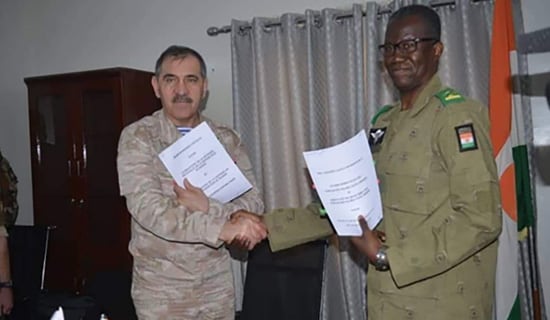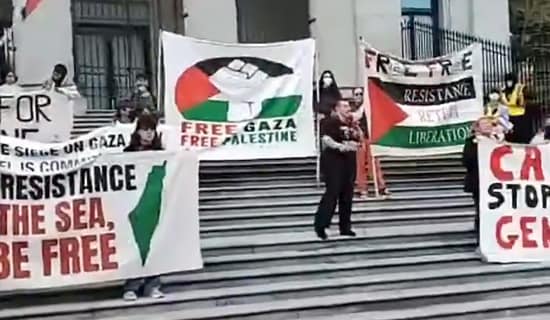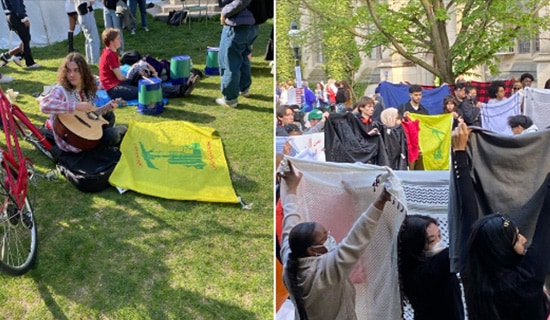In June 12-19, 2023, Iranian President Ebrahim Raisi made a five-day tour of three Latin American countries – Venezuela, Nicaragua and Cuba – at the head of a political and economic delegation.[1] Iranian spokespersons explained that the tour had two goals: a political goal, of forming an anti-American political coalition "in America's back yard," and an economic goal, of realizing Iran's economic interests in the Latin American market while circumventing the U.S. sanctions on it. In this context it is worth mentioning remarks made by Iranian commentator Ali Asghar Zarei in a June 27, 2023 interview with the ISNA news agency. Shedding light on Iran's map of strategic interests vis-a-vis the U.S., including in Latin America, he said: "In his speeches in the recent years, [Supreme] Leader [Ali Khamenei] has repeatedly used the phrase 'historic turning point,' and stressed in this context that the world is on the brink of significant changes. We see these changes reflected in regional cooperation in various parts of the world, including in East Asia and West Asia [the Middle East] and in Latin America. In the recent period we have witnessed the gradual collapse of America's monopoly and hegemony, and the failure of the notion of forming a unipolar [world] order. Global interactions have prepared the ground for a new world order… We have witnessed the emergence of regional powers and organizations like BRICS [Brazil, Russia, India, China and South Africa] and the Shanghai Pact,[2] and the gradual ousting of the [U.S.] dollar from international trade… In this framework, the Islamic countries can play an important role in shaping the new world order, thus restoring the Islamic nation to its proper place. In the new state of the global economy and the world order, the Arab and Islamic countries can play an important role by coopering with developing countries in Africa and Latin America, while [also] interacting with countries like China and Russia… Iran's capabilities in new high technologies and in the domains of missiles and defense have caused some of the countries in the region, including Saudi Arabia, to somewhat change their attitude towards Iran…"[3]
This report presents some statements by Iranian officials stressing the potential for political and economic cooperation between Iran and Latin America against the U.S.
Hojatollah Firouzi, Member Of Majlis Industries And Mines Committee: Venezuela Has Extensive Economic Potential And Is A Good Market For Us; We Can Operate There In Various Fields
In a June 16, 2023 interview with the ISNA news agency, Hojatollah Firouzi, a member of the Majlis Industries and Mines Committee, highlighted the strained relations that prevail between most Latin American countries and the U.S., and hoped that Iran could take advantage of this tension to cooperate with these countries economically and politically and to sell them technical and engineering services. He said: "
"The foreign policy of the Raisi government focuses on interaction with [a range of] world countries, and the [Iranian] politicians are trying to expand [Iran's] foreign relations. Among the countries that have extensive potential to benefit us economically and politically, thanks to their geographical location, are Latin American countries, with which we have had good relations in the past, especially Venezuela. [This country] has extensive economic potential and is a good market for us, and we can operate there in various fields. We share various political goals with Venezuela, and Raisi's visit to this country can no doubt realize these goals, which are [also] economic, based on the preplanning that was done and the elements that took part in the visit..."
Firouzi added that this visit could be considered "a maneuver in America's back yard," and that "the world too seems to be ready for a change in the global order. Different countries have been suffering from this situation [i.e., from the prevailing world order] for years. The countries of Latin America, situated in America's back yard, have been in conflict with America for years, due to their differences with it. America repeatedly tried to instigate 'color revolutions' within them, albeit without success..."

Hojatollah Firouzi, (Image: ISNA, Iran, June 16, 2023)
"Latin America can be a good market for our technical and engineering services and for [Iran-]manufactured goods. Also, our relations with Latin American countries mean that [our activities] – [namely] activity by Iranian companies abroad, and finding political projects to implement while also strengthening the political domain – can be effectively carried out in the American [continent], and can influence policy and also strengthen us on the political and security levels...
"Raisi's meetings with elites and students abroad [help to] spread Iran's beliefs. In the future the international community will surely be different than it is today and will advance towards [fulfilling] the will of the nations, which is to enact and realize justice, end discrimination and prevent the great powers from reaching out to steal the wealth of small countries."[4]
International Relations Expert Farshid Bagherian: "We Are Not Univited Guests In Latin American Countries ... We Have A Lot In Common With Them ... We Must Take Our Share Of The Potential And Opportunities The Region Has To Offer In The Existing Circumstances"
In a June 17 interview with ISNA, International relations expert Farshid Bagherian called on Iran "to take advantage of the new world order and the new means and opportunities, given everything we have in common with Latin America," in order to realize Iran's political and economic interests. He said: "The important point is that we are not uninvited guests in Latin America... During the era of [former Iranian president Mahmoud] Ahmadinejad, Iran had a conspicuous presence in the region and there were many agreements [between Iran and the regional countries]...
"[Former U.S. national security advisor John] Bolton said in an interview with Al-Jazeera that the Americans had been involved in more than 100 [cases of] coups, deposing of [leaders] and acts of subversion. One of the first coups [it instigated] outside its borders, during the Eisenhower administration, was the ousting of Iranian [prime minister Mohammad] Mossadegh [in 1953], and the other [coups] were mainly in South America. So from the point of view of [U.S.-instigated] coups or subversion, Latin America stands shoulder to shoulder with Iran. We have a lot in common, and this historical aspect is the reason we are not uninvited guests… We know [the Iranian resistance against America], and figures like Che Guevara, [Simon] Bolívar, [Emiliano] Zapata and others [also] tried to end America's colonialism and exploitation.
"Another issue that still exists in Latin America is the puppet governments set up by the U.S. in order to ensure that other countries cannot do anything or act. The members of those governments work to secure their [the Americans'] interests.
SUPPORT OUR WORK

Understanding these issues provides us with a tool for ensuring the survival of [our] relationship [with Latin American countries]. Since Iran's 86th Naval Fleet [mission] returned [from the Atlantic off the coasts of Brazil, Uruguay, Argentina and Chile in May 2023], access to the waters of the Caribbean and to waters [even] further away have improved. Therefore, the tools we need are now within Iran's reach. If we share historical and political experiences [with the Latin American countries], as well as various sentiments and investments, we must take advantage of this new world order and this tool [i.e., the shared hostility to the U.S.]… Today we have the tools to look beyond our borders...
'The Raisi government's approach is to foster [ties with] Latin America. We must play a role in the existing circumstances and [take advantage of] the potential and opportunities that this region has to offer... [This region holds opportunities because], in the future all cars will be electric, so demand for electricity in Europe will grow. Batteries will be important, and Latin America is one of the sources of lithium [used in batteries]... Venezuela also has some of the world's largest oil reserves, [so] there can be meaningful cooperation in the domain of oil… Based on our 25-year agreement with China, we can make joint investments or enact joint projects in Latin America…"[5]
Davud Salehi, Head Of The Latin America Department At Iran's Foreign Ministry: "Cooperation With Countries Like Cuba And Venezuela Can Lead Them To Support Iran In International Forums Like The UN, [On Issues Like] Human Rights, When Our Enemies Wish To Isolate Us"
In a June 14, 2023 interview with ISNA, Davud Salehi, head of the Latin America Department at Iran's Foreign Ministry and Iran's former ambassador to Cuba, stressed that Iran must break into new energy markets and thus also gain a political advantage in its conflict with the U.S. He said:
"In the context of the emergence of a new order in the Latin American region, [Raisi's recent] visit [there] can be seen as an encouraging sign. From the victory of the Islamic Revolution [in 1979] until today, Iran's [foreign] relations have always paid heed to Latin America. [This region] is considered the back yard of America, which does not allow anyone to come near to it. That is why Latin American countries, especially Venezuela, have always cooperated with us on the economic level, and Iranian governments, especially the Raisi government, have always paid attention to Latin America, due to its revolutionary history and its opposition to the Arrogance [i.e., to the U.S.].
"We must remember that Iran has political and international clout, and exports the products of its industry to several markets. We should find out what is needed and take steps to provide it…
"Venezuela is an oil-rich country occupying a strategic location in South America. As mentioned by [Iran's] oil minister in a recent interview, given the U.S. sanctions, we can take steps in the domain of oil and refineries, provide engineering services and invest in oil and gas… Cuba presents an unusual case. They want to cooperate with Iran, especially in the domains of biotechnology, livestock and agriculture. Cuba [previously] had joint projects in these domain with countries like France and Sweden. Cooperating with countries like Cuba and Venezuela can lead them to support Iran in international forums like the UN, [on issues like] human rights, when our enemies wish to isolate us… We are in a very good situation. Our ambassadors should take diplomatic action in the domain of human rights and economic advantages.
"Moreover, our relations with new superpowers like China and Russia have caused fear and alarm in some people. In the past we used to say that America was 'the chief of the [global] village,' but today there is no such thing. Now Iran has joined other superpowers, and believes in world peace…
"[The world] recognizes Iran's political and international clout, its significant status in the Persian Gulf, the Caucasus and the Islamic world, its industrial capabilities, and its variety of markets, abilities and needs, as well as its location in the middle of Asia. Defusing threats is one of Iran's major goals, and [its] foreign policy touches on regional and global issues…"[6]
Mohammad Mehdi Moftah, Chair Of The Iran-Venezuela Parliamentary Friendship Group: Iran Signed 27 Deals With Venezuela, Six With Cuba and Six Trade Deals With Nicaragua
Mohammad Mehdi Moftah, chair of the Iran-Venezuela Parliamentary Friendship Group, who accompanied Raisi on his visit to Latin America, reviewed the economic achievements of the visit: "President [Raisi] visited Venezuela, Cuba and Nicaragua, three countries that see eye to eye with us in terms of dealing with America. They [too] are subject to American sanctions, and tightening Iran's cooperation with them is very important. Many deals were signed between Iran and these three countries, including 27 economic deals with Venezuela, six with Cuba and six trade deals with Nicaragua...
"Venezuela provides many mining opportunities, and deals were signed with it in this domain. As for shipping, it was agreed to draft organized plans… Deals for selling crude oil and developing refineries are being considered. Given that Venezuela has automobile and tractor factories, it was decided to increase the interaction between the countries in this context. As for selling automobiles, it was agreed to raise the scope [of sales] to 10,000 vehicles by next year.
"Cuba has excellent capabilities in battery manufacture, and it was agreed to enhance the cooperation and interaction between Iran and Cuba in this context. It was also agreed to export certain products to Nicaragua, in exchange for minerals and materials we need. Medical equipment and pharmaceuticals, especially in Cuba, can form a good point of contact for our country. At the moment, the scope of our trade with Venezuela is $3.6 billion, and it was agreed to raise it, first to $5 billion, then to $10 billion and finally to $20 billion. Cuba is rich in aluminum, and it was agreed to take the necessary steps to import [Cuban aluminum to Iran]…
"Prices in Nicaragua are generally high, and that is an advantage in terms of exporting Iranian goods [there]. So good opportunities for export to this country have been identified, and a decision was taken to ship in minerals [we] need [from Nicaragua to Iran].
"It was decided to export high-tech products to Venezuela, Cuba and Nicaragua, and to establish high-tech facilities in Venezuela and Cuba. Five deals have been signed by Tehran and Caracas in this context, [including] a $15 million telecommunications deal.
"It was decided that 20% of Iranian products in the domain of medicine and medical gear will be exported to Cuba, while the necessary import would be carried out as well, and that a technological plant will be established in Cuba. High-tech [Food] supplements were tested in Venezuela's agricultural regions and they can be effectively utilized for extraterritorial agriculture. In fact, [both] Venezuela and Cuba present Iran with good opportunities of extraterritorial agriculture.
"As for the construction of power stations, it has been agreed to construct a 450 megawatt compound. Also discussed [during the visit] was the establishment of joint Cuban-Nicaraguan committees that will take the necessary steps to implement the agreements. The visit was undoubtedly successful on the political and economic levels, and I hope to see a growing development of the ties between Tehran and the countries of Latin America."[7]

Mohammad Mehdi Moftah, (Image: ISNA, Iran, June 19, 2023)
[1] Jamaran News (Iran), June 12, 2023.
[2] The Shanghai Cooperation Organization (SCO), also known as the Shanghai Pact, is a Eurasian political, economic, international security and defense organization established by China and Russia in 2001. Iran officially joined it on July 4, 2023.
[3] ISNA (Iran), June 27, 2023.
[4] ISNA (Iran), June 16, 2023.
[5] ISNA (Iran), June 17, 2023.
[6] ISNA (Iran), June 14, 2023.
[7] ISNA (Iran), June 19, 2023.




